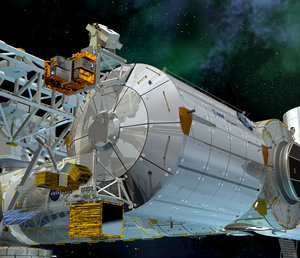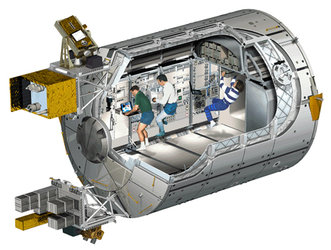ESA Columbus Essay Contest winner - Bernhard Schaffer
The value of human spaceflight for European citizens
Before going deeper into the subject matter and pointing out arguments for why Europe should invest into space flight, it seems suitable to start by recalling a period in Chinese history - the seven naval expeditions under the Ming government, being a turning point in Chinese history. Between 1405 and 1433, the Ming government sponsored a series of seven naval expeditions. Emperor Yongle designed them to establish a Chinese presence and to impose control over trade.
The missions showed impressive demonstrations of organizational capability and technological progress: the records and maps were believed to have depicted the Americas, Antarctica and the tip of Africa before any other official recordings. Former submarine commander Gavin Menzies, in his book 1421: The Year China Discovered the World, claims that several parts of the Chinese fleet explored virtually the entire globe.*
However after the emperor Yongle's death, the Hongxi Emperor, his successor, decided to cut down investments into the expeditions. Imperial officials claimed that the great voyages were not cost efficient. They stopped investing, destroyed most of the nautical charts that had been prepared during the journeys and instead embarked upon a massive and expensive expansion of the Great Wall of China.
They decided to turn away from the seas and underwent a period of technological stagnation. The ships remained in harbors until they rotted away, so did the know-how and skill for naval expeditions. In this environment, funding for naval expeditions simply did not happen, leaving the world for European nations to discover.
Just like 15th century China, Europe does have the potential, the organizational ability and technological might in order to go on expeditions and to establish a strong European presence. Today, these expeditions go to outer space. And, unlike China, European must not repeat the mistake of holding back from progressing but has to go on to use its resources and to invest in future developments and opportunities.
Old Europe and new Europe
Europe is one of the strongest players, economically and culturally- having the advantage of a diversity that gives us our strengths. As a world player Europe should also start working on gaining a reputation of striving for innovation. The values of old Europe - culture, class, sophistication, joy for life and traditions have turned Europe into the diverse and extraordinary union that it is nowadays. Based on our heritage, our generation has the duty, to continuously work in order to build a strong foundation and reputation for our future Europe- a future Europe that embraces progress, becomes aware of possibilities and starts using the resources that it has both in know how and in its people. We have to take the risk again to explore. Yesterday we explored our globe, today we should explore space.
The European Union has been founded as an incentive to show that century long conflicts can be settled for the pursuit of a common goal- peaceful collaboration with economic, cultural and social benefits. The past already showed and the future will prove how much can be achieved through inter-European co-operations that channel know how and skills from various nations, cultures - all with their own strength and expertise - and fuse it together for a great end product. Diversity is Europe's challenge, uniqueness and overriding strength. Different from other main players, Europe has to enter the game as a strong competitor relying on its diversity and collaboration skills to propel it towards success. "Europe invents and the U.S builds", this statement might have been accurate in the past but should not apply in the future any more. Europe invents and builds – that is the goal that we have to aim at. Gaining more confidence in recognising and exploring possibilities for progress.
So why do we invest large amounts of money into space missions even though the money might help to resolve global problems on our planet Earth? What's the reason for launching million dollar satellites for the monitoring of black holes which might never concern us? What are the benefits and returns of profit for all this?
We cannot tell you that – yet. We are unsure of the scope of benefits and the returns of profit but we must not make the mistake to let this prevent us from advancing and giving our best in the area of research, development and exploration. It is important to find steady ground in the area of space development and exploration, both technologically and economically because what is "out there" cannot be ignored as little as the fact that human kind will eventually attempt to use space for resource reasons or colonisation.
Considering the breath taking pace of developments, it is crucial to start seeing opportunities and future potential before others do and to start planning on time. Turning a blind eye and rejecting progress only works for that long- once the future has reached you and hit you in the face, your eyes fly wide open. Anticipating, planning and being prepared is crucial recipe in everyday life for success- and it is going to be what Europe has to do in order to not only rely on its strong heritage but to start working on a new progressive foundation that future generations will be able to build upon.
Even though opportunities for profit and economical possibilities are not obvious yet, one should consider that any investment done at the moment goes and is already going into developing the technological tools that will lead Europe towards success. The successes that we will celebrate in space will be a source of common pride. Uniting and motivating the diverse European nations and their people, spaceflight can become our common goal.
Coming back to our historical account about China's great period of naval expeditions, we can - looking back from the 21st century - conclude that by stopping their fleet, China prevented itself from progressing. Because the future seemed too cost intensive, money was rather spent on building the Great Wall. A more ‘safe’ investment with visible returns of profit. What they really did, was literally locking themselves behind the doors of their past instead to open them up to the future.
With the chances and opportunities that Europe can seize in the area of space exploration and development, we have to leave our doors and minds wide open, shape and welcome the future.
Again we should be pioneers. Today, the only difference is that our ships are faster and leave our new harbours with X tons of thrust.





